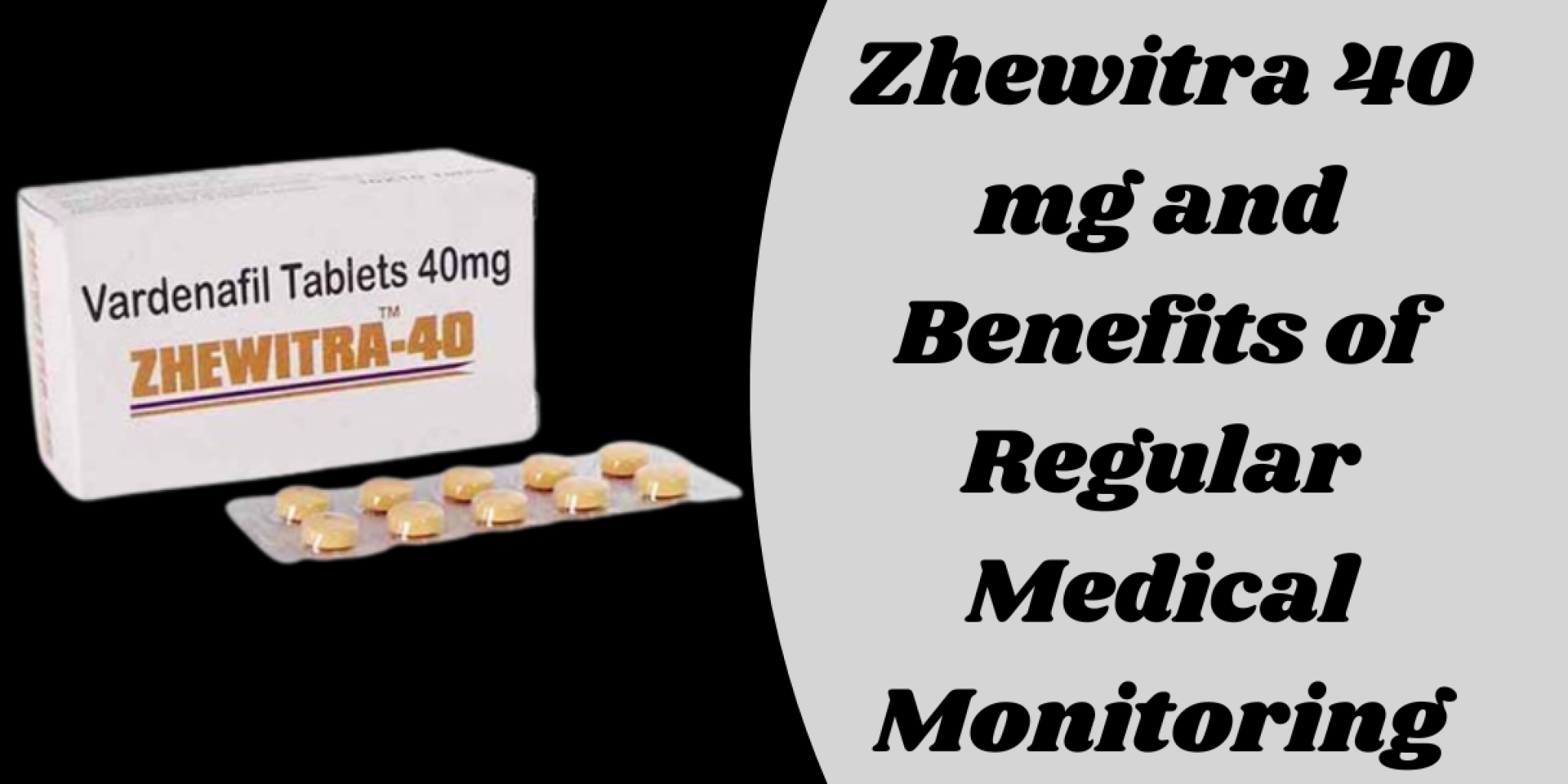Zhewitra 40 mg and Benefits of Regular Medical Monitoring
 0
0
Posted: Sat June 28 10:39 AM IST
Business: My Business Name
Tags: zhewitra 40 mg

Erectile dysfunction (ED) is a condition that affects millions of men worldwide, often leading to decreased self-esteem and relationship issues. Among the various medications available for ED treatment, Zhewitra 40 stands out due to its effectiveness and reliability. However, while using such medications, regular medical monitoring plays a crucial role in ensuring both safety and optimal results. This article explores Zhewitra 40 mg in detail and emphasizes why routine medical oversight is vital for men using this treatment.
Understanding Zhewitra 40 mg
Zhewitra 40 mg contains Vardenafil, a potent phosphodiesterase type 5 (PDE5) inhibitor that helps increase blood flow to the penis, making it easier for men to achieve and maintain an erection during sexual activity. It works by relaxing blood vessels and improving circulation, but only in the presence of sexual stimulation.
Zhewitra is generally prescribed to men who have not responded adequately to lower doses or other ED treatments. Its fast onset (within 30-60 minutes) and duration of action (up to 5 hours) make it a suitable choice for many users. However, it’s essential to remember that this is a prescription medication, and self-medication without a healthcare provider's guidance can lead to complications.
Benefits of Zhewitra 40 mg
Many men turn to Zhewitra 40 mg after experiencing subpar results from other ED drugs. Some of its notable benefits include:
- Rapid onset of action – allowing for greater spontaneity in intimate moments.
- Effective for various causes of ED, including psychological, vascular, or diabetes-related.
- Lower likelihood of causing vision-related side effects compared to similar medications like Sildenafil.
- Enhanced sexual confidence, improving overall quality of life.
These benefits, however, can only be realized fully when the drug is used appropriately under medical guidance.
Importance of Regular Medical Monitoring
ED is often a symptom of underlying health conditions such as cardiovascular disease, diabetes, obesity, or hormonal imbalances. Regular monitoring helps doctors detect these root causes early. More importantly, medical oversight ensures the safe and effective use of medications like Zhewitra 40 mg.
Medical monitoring helps in:
- Preventing adverse effects by adjusting doses or switching medications.
- Identifying potential drug interactions, especially if the patient is taking other prescriptions for high blood pressure, cholesterol, or depression.
- Tracking long-term efficacy and making necessary changes for optimal performance.
Skipping regular check-ups might result in unrecognized side effects, such as fluctuations in blood pressure, dizziness, or rare allergic reactions.
Key Parameters Monitored During Treatment
When using Zhewitra 40 mg, healthcare providers usually monitor the following:
- Cardiovascular health – since ED medications affect blood vessels, it’s crucial to monitor heart rate and blood pressure regularly.
- Liver and kidney function – as these organs metabolize and excrete the drug.
- Testosterone levels – low levels may continue to affect libido and performance even when using ED medication.
- Side effect profile – any headaches, flushing, vision changes, or prolonged erections (priapism) should be reported immediately.
Adjustments in dosage or timing can be made based on these findings, improving the patient’s safety and satisfaction.
Patient Education and Compliance
One of the often-overlooked aspects of ED treatment is patient education. Many men hesitate to speak openly about their issues or stop taking medication due to temporary side effects or unrealistic expectations.
Medical monitoring provides an opportunity to educate patients about:
- How Zhewitra 40 mg works and what to expect.
- The importance of timing—taking the tablet about an hour before anticipated activity.
- What foods or substances to avoid, such as alcohol or grapefruit juice, which can interfere with absorption or effectiveness.
Improved understanding leads to greater adherence, which translates to better results and fewer side effects.
Case Studies and Real-Life Experiences
Numerous men have reported Zhewitra 40 mg improvements in their sexual health after using Zhewitra 40 mg—especially when combined with regular follow-ups. For instance, a 52-year-old patient with diabetes reported increased confidence and stronger erections after six weeks of monitored use. Another patient was able to identify and manage mild blood pressure issues early through routine check-ins, preventing potential complications.
These real-life cases highlight how medical supervision makes a meaningful difference in the success of ED treatment.
Conclusion
Zhewitra 40 mg is a powerful solution for men struggling with erectile dysfunction, especially when other treatments fall short. But like all medications that influence the cardiovascular system, it demands regular medical monitoring. This ensures the treatment is not only effective but also safe in the long term.
Men using Zhewitra should commit to periodic check-ups, open communication with their healthcare providers, and responsible medication use. Doing so transforms treatment from a temporary fix into a sustainable path to improved sexual health and confidence.
Comments
Please login above to comment.
